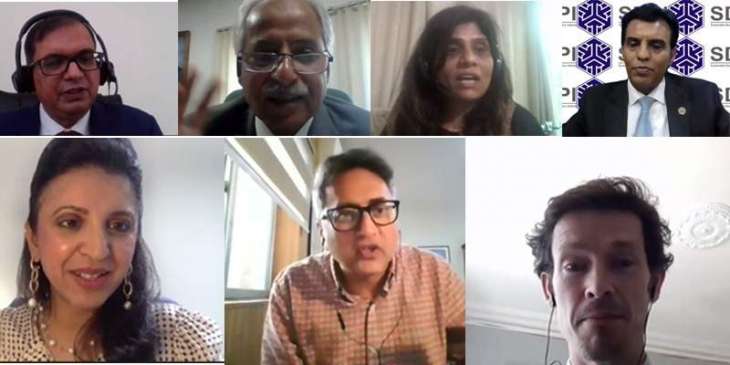International Water Management has organized a webinar on World Water Day to draw attention to valuing Pakistan’s depleting natural resource.
LAHORE: (UrduPoint/Pakistan Point News-March 23rd, 2021) Experts mark World Water Day 2021, draw attention to valuing Pakistan’s depleting natural resource
A panel of distinguished experts on water stressed the need for collaborative national measures to value water across multiple sectors keeping in view the dwindling natural resource.
The experts gathered for a webinar under the banner of International Water Management Institute (IWMI) Pakistan on World Water Day, here on Monday.
Moderating the session, Dr Mohsin Hafeez highlighted the role of water for driving diverse sectors like livestock, dairy, energy and industry.
Dr. Hafeez, who can be termed ‘water advocate’, emphasized how technology can be tapped for conservation of water in Pakistan, the country that is now 5th most vulnerable to climate change.
In his keynote speech, Dr Muhammad Ashraf explained that the value of water hinged on the sector and its purpose where it was being utilized. The expert outlined that only after realizing the actual value of water, measures could be taken for innovation and investment in the sector. Dr. Ashraf also brought in the concept of how water was directly linked to Sustainable Development Goals. The Chairman Pakistan Council of Research in Water Resources (PCRWR) also elaborated the concept of human security associated with water governance and management.
‘We need to take water as a commodity and a shared resource,’ said Dr. Ashraf while suggesting measures like e-flow and watershed for better conservation of water besides setting up an authority in this regard.
Painting a bleak picture about the productivity of water, Dr. Ashraf said that less than 1 percent of waste water was treated in Pakistan. The official also highlighted the key areas which were being ignored like national database for water use pattern. Dr Ashraf also proposed solution to the longstanding problem including volumetric water pricing, restricting high delta corps and adaptation of climate resilient seeds.
‘For instance, as much as 40 percent of water is lost in leakage in Islamabad,’ said Dr. Ashraf as he detailed the problems in water management framework of the country.
He continued that Pakistan needed to strike a balance between water extraction and recharge.
One of the panelists, Dr Robina Wahaj lamented the lack of credible information and data regarding water usage despite the fact that reporting of water levels in canals was in place. Wahaj, the Senior Land and Water Officerat FAO, stressed that water allocation was a politically sensitive issue in the country.
‘National Water Policy in 2018 did not account for actual water usage by different sectors,’ said the expert and added that non-agriculture sectors were not under the limelight in water efficiency discourse.
The development practitioner regretted that harnessing data for policy implementation was missing in the aquatic framework of Pakistan.
Dr Mohsin Hafeez also brought in Hammad Naqi Khan over the issue of policy options for water conservation to which the expert outlined that Pakistan lacked policy enforcement despite the introduction of regulatory framework in this regard.
‘Only by implementing national climate change policy, we can address a whole host of problems ranging from water to environmental issues,’ said Hammad Naqi, the Director General, WWF-Pakistan.
The WWF representative also revealed the formulation of ‘Recharge Pakistan’ program based on nature based solutions aimed at mitigating the ensuing crisis.
Ms. Yasmin Siddiqialso took part in the discussion and explained that ‘Water Development Outlook’ was devised by Asian Development Bank (ADB) taking into account water security through multi-sectoral approaches. The official said New Zealand, Australia and Japan topped the Water Development Outlook and fared better than other countries.
‘Technology, capacity building and infrastructure are key areas to focus for effective water utilization,’ said Siddiqi and elaborated that distribution mechanism was being altered for Greater Thal Canal project in Pakistan.
On the issue of climate change linkage with water management, Dr David Potter highlighted that ‘South Asia Water Governance Program’was devised by the United Kingdom for database management.
‘Collaboration is the key to success at different levels of governance,’ said Dr Potter.
Moreover, the executive Director of the Sustainable Development Policy Institute (SDPI), DrAbidQaiyumSuleri, dished in on the devastation caused by the Covid-19pandemic and how water occupied the top spot in mitigation strategies. He hammered the issue of social behaviors and lack of coordination between different tiers of government and non-government agencies, perpetuating the crisis.
‘Institutional arrangement has to be in focus for synergy,’ said Dr Sulehri.
The policy expert underlined the need for rational water pricing based on ‘social justice’ citing same tariff for cotton and rice growers.
In his concluding remarks, Dr Mohsin Hafeez stressed the need for conducting water audit in a bid to make the delivery process efficient and transparent .Dr Hafeez - who has under his belt decades of experience regarding water management – lauded some of the initiatives launched by the government including the formulation of first ever water policy. The expert also put under focus the role played by IWMI since 1986 in this regard.




